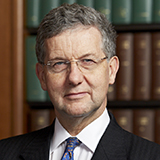UK: Courts ‘still obliged’ to refer unclear EU law issues to CJEU

Lord Hodge
The UK Supreme Court is “still obliged” to refer questions over unclear EU laws to the Court of Justice of the European Union (CJEU) at this stage of the Brexit process, Lord Hodge has said.
The deputy president of the court made the remarks yesterday as he delivered, via video link, the court’s unanimous judgment in a complex VAT case on behalf of Lord Sales.
Lord Hodge said: “It is common ground that at this stage of the process of the United Kingdom’s withdrawal from the European Union, in a case concerning an issue of EU law which is not clear, this court is still obliged to refer that issue to the CJEU to take its advice on the point.”
The UK formally left the European Union on 31 January 2020, but is now in a “transition period” until at least the end of 2020 while the UK and EU negotiate additional arrangements.
The Supreme Court’s decision was criticised yesterday by Martin Howe QC, chairperson of the pro-Brexit group Lawyers for Britain.
Mr Howe told The Times that the judgment “highlights that the UK will suffer continuing interferences to the sovereignty of our legal system for many years to come, from a court which is now entirely foreign, contains no UK judge, and has no duty to uphold the interests of the UK now we are not a member state”.
He added: “This judgment illustrates the vital need to modify the parts of the withdrawal agreement, which will require the UK to be bound by rulings of the ECJ after the transition period ends on December 31 this year.”







